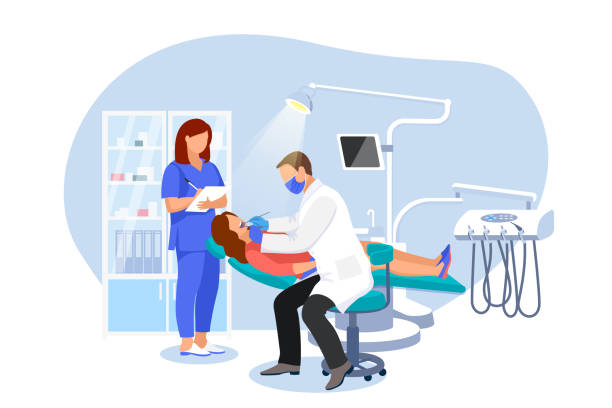Mon-Sat 9am-7pm











Speech pathologists assist patients who have disabilities or experienced traumatic events that left them with speech, voice, or swallowing impairments. These professionals may also be known as Speech-language pathologists or speech therapists.
To succeed as a speech pathologist, you should be willing to alter treatment plans to better suit the individual needs of a diverse patient population. You should be caring, adaptable, analytical, and resourceful.

Speech-language pathologists typically need at least a master's degree in speech-language pathology. These programs usually take 2 years of postbaccalaureate study. Although master's degree programs may not require a particular bachelor's degree for admission, they frequently require applicants to have completed coursework in biology, social science, or certain healthcare and related fields. Requirements vary by program.
Graduate programs often include courses in speech and language development, age-specific speech disorders, alternative and augmentative communication, and swallowing disorders. These programs also include supervised clinical experience.
Graduation from an accredited program is required for certification and, often, for state licensure. The Council on Academic Accreditation (CAA), accredits education programs in speech-language pathology.
Average salary for a Speech Language Pathologist in India is 4 Lakhs per year (?33.3k per month). Salary estimates are based on 54 latest salaries received from various Speech Language Pathologists across industries.
Nursing and residential care facilities - $99,340
Hospitals; state, local, and private - $95,620
Offices of physical, occupational and speech therapists, and audiologists - $93,510
Educational services; state, local, and private - $75,270
One of the primary benefits of working as a speech therapist is the ability to work one-on-one with patients. This is a good way to provide specialized care to individuals undergoing speech therapy, as you can learn their different learning patterns and behaviors over time. With direct patient care, you can provide the best service possible to your patients and make a significant different in their verbal communication abilities.
Another common benefit of becoming a speech therapist is the rewarding nature of the work. As a speech therapist, you may find yourself working with children and adults who desperately need your services to communicate with the rest of the world. Once you start to see the effects of your hard work as your patients advance, you can feel pride knowing that you're making a difference in the lives of others.
The field of speech therapy and pathology is constantly growing, as more and more parents begin to identify deficiencies in children's communication and language abilities earlier on. As a speech therapist, you're likely to have little to no problem finding a job once you earn all of your qualifications. During times of economic or social uncertainty, knowing that there's usually demand for your occupation can be a major stress-reliever.
As a speech therapist, you have room to grow within your career once you enter it as a licensed professional. For example, if you start your career by working as a speech therapist at a school, your next career move may involve working at a hospital or rehabilitation center as a more senior-level speech therapist. This room for growth can provide constant motivation for you as you progress in your career.
If you're interested in finding a career with a flexible schedule, going into speech therapy may be the best choice for you. As a speech therapist, you can generally choose your hours of operation, especially if you work in your own clinic or practice. Even for those that work at schools or hospitals, the typical hours of a speech therapist follow standard work schedules, meaning you're likely to have nights and holidays off.
If you're the kind of person who values a change in scenery from time to time, pursuing a career in speech therapy may be a good match. Speech therapists often work in different environments, such as hospitals, clinics, rehab centers and schools. If you work as a freelancing speech therapist, different offices may call you in depending on the day, meaning you're likely to have a constant change of work environment.
Speech therapists also have the ability to pursue a specialization, which is another key benefit of the career. If there are certain elements of the profession that are more attractive to you than others, such as working specifically with infants or people recovering from traumatic brain injury, you have the ability to specialize in the topic of your choice. This can make your career more enjoyable, as you'll be working specifically in a specialization that you value.
Another benefit of working as a speech therapist is that you can enjoy having stable job security. Many speech therapists work under contracts, especially those who work primarily in schools or hospitals. The high demand for speech therapists also makes it so that you can likely find a job with little issues should your employer ever let you go for whatever reason.
Perhaps one of the most common benefits of becoming a speech therapist is the ability to earn a high wage. According to Indeed salaries, a speech therapist can make an average of $95,196 per year. This high salary can give you various opportunities to invest in other aspect of your life, such as college funds for children, vacation or paying off student loans.
:One common con of becoming a speech therapist is the extensive education necessary for entering the field. Certified speech therapists usually need a master's degree in speech pathology along with licensing requirements, which can be costly and time-consuming. Despite this, you can learn a great deal from your time in university and apply all of the curriculum and lessons from your schooling toward your every day career practices as a speech therapist.
While one of the common benefits of working as a speech therapist is the flexible schedule, a con is the time-consuming nature of the career. Unlike other professions, speech therapists are unable to stop thinking about work the moment they clock out, as they often have to conduct additional research and fill out paperwork after their shifts. You can overcome this issue by setting aside a specific day or days every week to dedicate to this additional work, so that the rest of the week you can come home and relax after work.
As a speech therapist, you may find yourself spending a substantial portion of your workdays, and even after work hours, filling out paperwork. This is especially true for speech therapists that work in schools or hospitals, where they must keep specific records of each individual patient and their treatment. A solution to this issue is to work on paperwork throughout your day rather than leaving it all for the end of your shift.
If you want to pursue a career as a speech therapist, it's important to familiarize yourself with the different licensing requirements for the profession, which can vary by state. Many of these licenses require candidates to pass exams and log extensive clinical hours before being able to earn the credential. While this process can be less than favorable, try to remind yourself of the valuable experience and information you're gathering from earning this important credential, which brings you one step closer to changing lives as a licensed speech therapist.
Another common drawback of becoming a speech therapist is the high pressure nature of the profession. As a speech therapist, you're responsible for helping your patients gain verbal skills, which they will use for the rest of their lives to communicate and function in society. To mitigate this con, you can set aside time every day to do a relaxing and fulfilling activity, such as yoga, reading, journaling or meditation, and reflect on the positive and rewarding aspects of your profession whenever you're feeling stressed.
As a speech therapist, you may find yourself spending a significant part of your workdays with children, particularly ones with developmental delays or disorders. It's common for speech therapists to deal with temper outbursts and general conduct issues, which can be stressful. You can mediate this, however, by informing yourself on the various types of conditions and disorders that affect behavior and learn ways to combat these issues when working with patients, such as exercises or distractions.
If you're planning on becoming a speech therapist, it's important to understand that you'll likely work on your own for a majority of your workday. Speech therapists usually work in one-on-one sessions with their patients, meaning you may have limited time speaking with and building dynamics with your colleagues. One solution to this is to join an online community, such as on social media, where you can connect with other speech therapists and discuss various topics related to your career.
Analytical skills. Speech-language pathologists must select appropriate diagnostic tools and evaluate results to identify goals and develop a treatment plan.
Communication skills. Speech-language pathologists need to explain test results, diagnoses, and proposed treatments in a way that individuals and their families can understand. They also must be clear and concise in written reports.
Compassion. Speech-language pathologists may work with people who are frustrated by their communication difficulties. They must understand and be supportive of these clients and their families.
Critical-thinking skills. Speech-language pathologists must be deliberate in making assessments to create treatment plans tailored to individual needs.
Detail oriented. Speech-language pathologists must comprehensive notes on clients' progress to ensure that they continue receiving proper treatment.
Listening skills. Speech-language pathologists must pay attention to hear the clients' communication difficulties and determine a course of action.
Call us at +91 9205084085, Monday - Friday, 9 am - 7 pm


